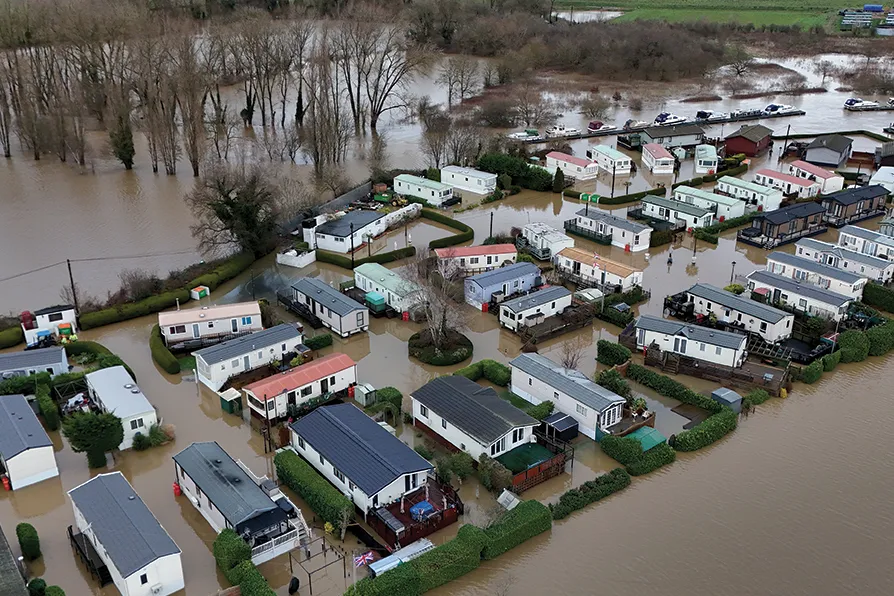Corbyn’s intervention exposes a corrupted system, writes CLAUDIA WEBBE
Ahead of the CP’s Congress later this month, RICHARD HEBBERT looks at the pressing climate issues humanity faces and their interdependence with capitalism

 THE NEW NORMAL: The Little Venice caravan park in Yalding, Kent - across England, there were 198 flood warnings and 300 flood alerts, January 2025
THE NEW NORMAL: The Little Venice caravan park in Yalding, Kent - across England, there were 198 flood warnings and 300 flood alerts, January 2025
MAYBE you think that, yes, it’s an issue, even an important one, but there’s other stuff we need to deal with first — the far right need to be opposed, there’s genocide in Gaza and a war in Ukraine and we need to confront the narrative around the China threat and the Cuban blockade.
Or maybe, like some, you feel that somehow climate change and environmental degradation is an extra-political issue, too important, existential even for political solutions, so we should put aside our political differences in the interests of the planet.
Or maybe you’re just filled with despair because there’s nothing we can do — the UN’s target to restrict post-industrial global warming to 1.5°C has failed and the political wind is increasingly right-wing and climate sceptical, so we can just metaphorically put our fingers in our ears and hope that we escape the worst.
But, if you’re a communist, or a socialist what drives your political agenda is an understanding that what has most shaped the post-industrial world and continues to do so is the smothering blanket of capitalism and its remorseless drive for profit and you want to do something about it.
But capitalism doesn’t distinguish between whether an opportunity for money-making is ethical or not and it doesn’t prioritise one source of profit over another, it has its fingers everywhere — and so should we.
The point being that the struggle against capital is all encompassing and understanding and campaigning on the environment is an important part of that.
If you want authority for that proposition, look no further than Karl Marx and Friedrich Engels, who, beginning with Kapital and Dialectics of Nature, acknowledged the effect of industrialisation — and thus the profit motive — on nature and natural resources.
But where Marx and Engels led, others were to follow and we can trace an unbroken line of Marxist ecological thought through the socialist ecologists of the late 19th century (Lankester and Tansley), some of the great Marxists of the 20th century (Luxemburg, Lukacs and Mezaros) and the work of some Soviet scientists on biogeocoenosis and climataology and early thinking on climate change to the advent of the modern environmentalist movement and in the 21st century, a resurgent Marxist ecology in the work of Paul Burkett, James O’Connor’s second contradiction of capitalism (exhaustion of resources and overproduction leads to rising production costs and reduced profit) and of course the work of John Bellamy Foster.
The environmental and climate struggle is no different from any other Communist Party campaign — indeed it is a vital part of the all-encompassing fight with capitalism.
Communists have to take up the environmental struggle with all the pugnacity, intellect and resourcefulness which we bring to our work elsewhere; time is short and capital is incapable of effective climate action because of the contradiction between the need for mitigation and adaptation and the drive for profit — the very cause of the climate and environmental crisis in the first place.
We are approaching the start of Cop30, on November 10, in Brazil at which participating nations are to be required to update their plans of action to meet the, now 10 years old Paris Agreement to restrict post-industrial global warming to no more than 1.5°C.
We know that that those 10 years have been squandered where participating nations have not done nearly enough to meet the target and have failed to contribute anything like the £1 trillion required to mitigate the effects of climate change in the global South.
As world governments fail to take any meaningful action — and in fact reverse many of the climate promises previously made, the effects of climate change continue to increase, we see wildfires in many different places, flooding, desertification, famine and disruption to food production and forced migration.
Meanwhile, the world edges ever nearer to tipping points; the death of coral reefs, dieback and the destruction of rain forests, the world’s major ice sheets melting, the thawing of permafrost which holds huge amounts of carbon and the collapse of ocean currents, which have the potential to cause irreversible changes to the Earth.
The effects are not just on the global scale. In our own country we are seeing increased rain fall disrupting crop production, more and more fires on moorlands, regular flooding in towns and carbon emissions in built-up areas.
The Labour government while reducing the use of fossil fuels in the generation of power, continues to licence oil and gas production in the North Sea and pay millions of pounds to the power station at Drax to burn polluting and environmentally destructive wood pellets.
If not now, when?
The party has just joined comrades from the Communist Parties of France, Spain and Portugal and the Workers Party of Belgium in issuing a joint statement on Cop30. It is an energising development to work with comrades in other countries — but it is up to all of us to keep the fight against the capitalist destruction of the planet at the top of our political agenda.
Richard Hebbert is the convener of the CPB environment commission and member of the executive committee.










